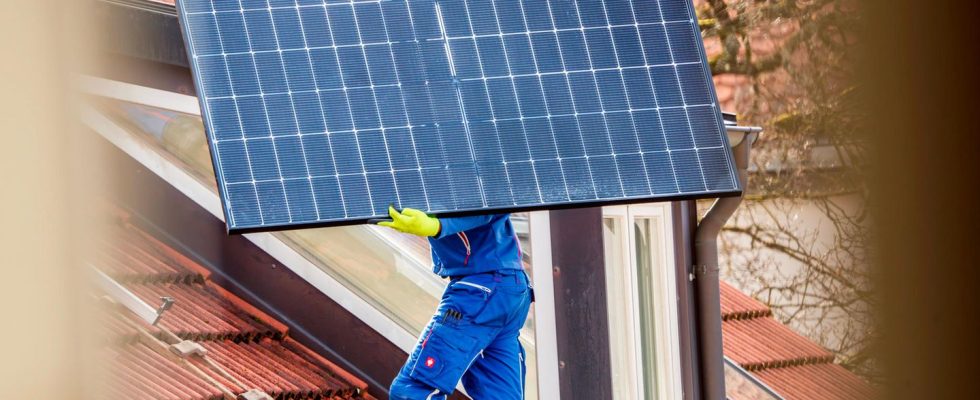analysis
Climate protection
Drastic decrease in Co2? True – but it’s window dressing
Installation of a solar system on a private house roof in Munich. The expansion of PV progressed well in 2023, but not yet fast enough to meet the federal government’s expansion goals by 2030.
In 2023, Germany will have saved more greenhouse gases than it has since 1990. So can we proudly pat ourselves on the back? Rather no. Five questions, five answers.
It sounds like perfect news for the traffic light: “Emitted in 2023 “Germany will have 10.1 percent fewer greenhouse gases (GHG) than in 2022,” reports the Federal Environment Agency (UBA). This is “the sharpest decline since 1990.” Federal Minister of Economics Robert Habeck is enthusiastic: “Germany is on track – for the first time.” He predicts: “If we stay on course, we will achieve our 2030 climate goals.”
It is not surprising that the responsible minister Habeck, battered by poor surveys, assesses the situation this way. Unfortunately, the Green’s analysis is incorrect. Because the decline in Co2 has only marginally to do with the traffic light’s climate policy. It results primarily from the global crises that have hit Germany hard. The UBA report also shows this – if you read it carefully.
Environmentalists are outraged by so much euphoria from the UBA and the Greens. Viviane Raddatz, head of climate at WWF Germany, says: “Any joy about the significant reduction in emissions and effective climate protection measures quickly gets stuck in the throat. A look at the causes reveals that political and economic crises are reflected here, instead of the will for transformation and structural climate protection measures in all sectors.” Martin Kaiser, managing director of Greenpeace Germany, warns: “Nobody should confuse a struggling economy with climate protection!”
Here are the most important questions and answers:
How does the CO2 decline come about?
The main part comes from declines in production in the energy-intensive industry (steel, glass, cement). This is not a success, but an economic setback triggered by the war in Ukraine and the energy crisis. They caused demand for industrial goods to collapse. Therefore, production was reduced and the power plant operators were able to supply less electricity or process heat to the companies. Above all, fewer fossil fuels, such as gas, coal and oil, were burned.
Have private households also saved?
Yes. According to the UBA, the fact that emissions in private households have fallen is not due to the fact that they are switching to climate-friendly technology on a massive scale, but primarily due to the warm winters and high energy prices. Utility bills forced consumers to turn down their heating and turn off their lights more often. The trend is currently changing again: at the end of 2022, 43 percent of Germans wanted to save energy, but now that electricity and gas prices are falling, the figure is only 29 percent.
Is it because of the wind turbines and PV systems that we are making progress?
On the one hand, there is really good news: the share of renewable energies in electricity generation increased from 46 to 56 percent in 2023. On the other hand: Energy is also heat, there is no such progress. Rather, progress there is very slow. This is worrying because heating (and cooling) causes around 30 percent of total German CO2 emissions. The new building energy law with its generous subsidies was not convincing. Of the heaters installed in German households in 2023, 70 percent run on gas and oil. The Germans continue to be very cumbersome when it comes to heat pumps and other climate-friendly heating technologies.
How is the transport sector doing?
There is the greatest desolation there. The attempt to convert transport to e-mobility is currently in danger of failing. Sales figures for electric cars are collapsing. The UBA also says that the transport sector is “significantly missing its target and moving further away from the statutory target path”.
Are we really on schedule, as Habeck claims?
Habeck is pretty much alone with this assessment. Researchers, energy managers and investors see it differently; they fear that things will be very, very tight. Georg Stamatelopoulos, board member at the energy company EnBW, says so star on the planned earlier coal phase-out in 2030: “The project is extremely ambitious. We have always said that in order to accelerate the phase-out of coal, significant progress is needed in the expansion of renewables and the networks.”
But despite a few bright spots, we are lagging behind the goals of the current climate protection law everywhere, in wind power, photovoltaics, power lines and gas power plants that can later run on green hydrogen. The federal government is constantly passing new acceleration laws, but they have yet to demonstrate a significant impact.
Although the bad times have forced Germans to save CO2, UBA President Dirk Messner comes to the conclusion that the 2030 climate goals are achievable “if we continue to work so ambitiously on climate protection.” So “ambitious”? Unfortunately, this does not yet reflect reality. Messner’s agency is nominally independent and generally does clean, good work.
But you should at least keep in mind that it is subordinate to the Federal Environment Ministry. And that is led by the Green Minister Steffi Lemke.



